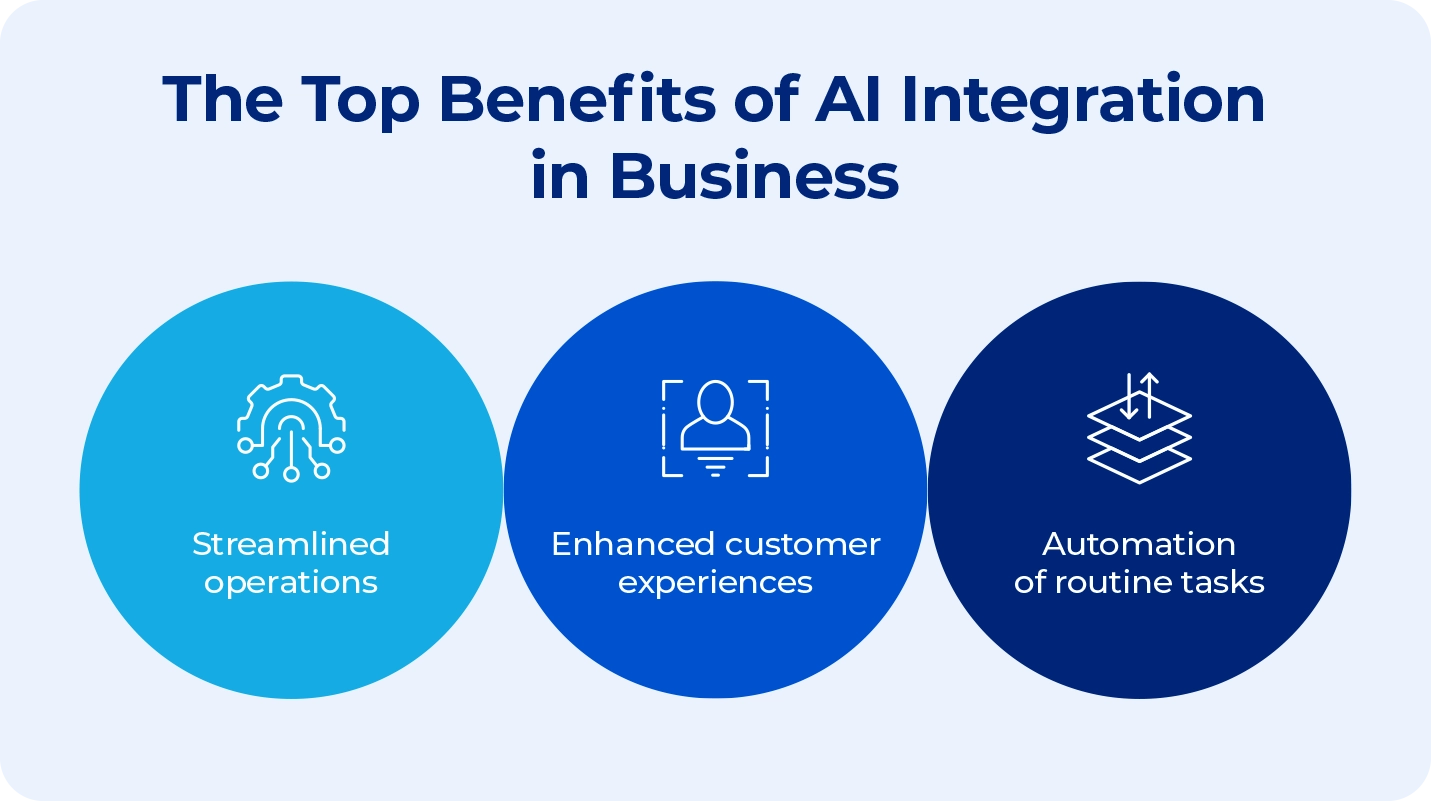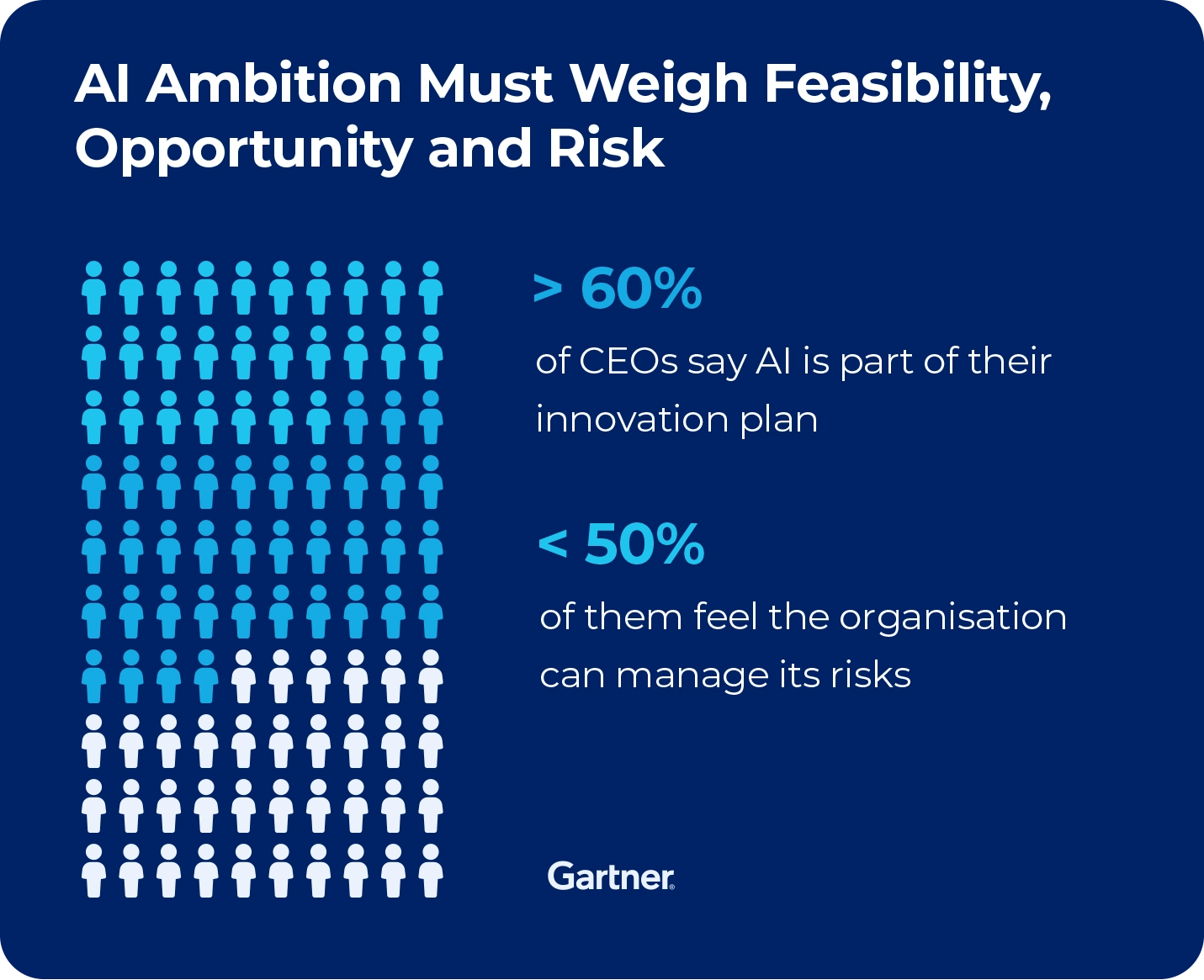Artificial intelligence (AI) creates seemingly limitless opportunities across industries, but that does not mean you only reap the benefits of driving innovation. Any company that has attempted to implement AI in business has quickly found that there are numerous challenges to tackle beyond the obvious advantages and varying degrees of success.

Streamlined operations and data-driven decision-making are among the top reasons that make AI integration into business processes inevitable. Automating routine tasks, deriving actionable insight through data analytics, improving customer experiences – AI has already revolutionized the way forward-thinking companies’ function.
This article explores both the undeniable AI capabilities and the unavoidable challenges they need to overcome daily while preparing for the fast-approaching new ones.
Efficient Operations
AI incorporation into business operations significantly boosts efficiency and productivity while reducing manual labor and optimizing resource allocation. By automating time-consuming tasks, AI allows human experts to turn their attention to more sophisticated, strategic, and value-added initiatives that require soft skills that technology struggles to emulate.

Streamlined Workflows
Rapid and precise analysis of massive data sets enables the detection of trends, anomalies, or inefficiencies in business processes. This way, companies can optimize workflows, reduce waste and improve productivity. Suggesting the best possible routing for supply chain logistics or making recommendations to enhance processes based on accumulated performance data are just two examples of how businesses can benefit sufficiently from AI involvement.
Automated Routine Tasks
AI is extremely efficient in automating repetitive tasks like data entry or report generation, not to mention humans can never replicate its velocity and precision. Such automation saves valuable time and drastically reduces the number of human errors resulting from manual processing. It also allows professionals to focus on more creative and strategic activities where an individual’s experience and critical thinking are irreplaceable.
Sharper Decision-Making and Strategic Planning
When accessing sizeable datasets, AI solutions excel at processing and analysis to generate actionable insights and recommendations. AI data-driven analytics bases strategies, forecasting, and decision-making on numerical evidence. As a result, companies accelerate time to market and gain critical competitive advantages to stay ahead of the curve.
Improved Customer Experiences
AI can help businesses provide tailored services that meet evolving customer expectations. AI-powered solutions analyze historical data from the web, cloud and social media regarding buyer habits and behaviors to personalize customer experiences with unrivaled precision. Therefore, tailored product recommendations and personalized marketing communication boost engagement rates as the personal touch inevitably increases customer satisfaction and loyalty.
Round-the-Clock Customer Support
AI-driven chatbots and virtual assistants are becoming ubiquitous for 24/7 customer support. Their speed and precision are ideal for receiving queries and resolving problems, as they can handle numerous customer interactions simultaneously with a consistently high quality of service. This is especially true for issues that do not require soft skills and critical thinking, while more sophisticated inquiries can be redirected to human customer support professionals.
Predictive Customer Service
AI’s prowess at analyzing sizeable records of customer behaviors and habits makes it invaluable for detecting patterns and anomalies and forecasting trends or potential issues well in advance. This enables businesses to anticipate significant future events and proactively address buyers’ concerns to enhance customer satisfaction and provide more positive experiences.
Driving Innovation and Product Development
AI-driven innovation contributes to exploring new opportunities, fine-tuning existing products and services, and building cutting-edge solutions. For example, in the pharmaceutical industry, AI algorithms are utilized to fast-track research, accelerate the development of new drugs, and build sophisticated equipment that enhances medication quality and makes potentially life-saving pharmaceuticals more affordable. The evolution of AI technology also contributes to developing totally new categories of products, including smart home devices, AI-enabled remote patient monitoring systems, autonomous vehicles, and many more.
Accelerated Research and Development
With access to massive volumes of scientific and market data, AI algorithms can detect opportunities for research directions and innovative products. Furthermore, innovative tech teams can specify parameters to direct Generative AI solutions in creating novel designs or products. Such collaboration of human expertise and AI capabilities seriously accelerates R&D processes while reducing the necessary resources, which inevitably results in quicker time to market and gaining a competitive edge.
Automated Financial Management
BFSI organizations leverage advanced AI tools to enhance precision, productivity, consistency and security in financial operations. AI solutions that automate the collection, processing, analysis, and reporting of economic data, accelerate financial reporting and free up resources that would otherwise have been dedicated to manual data processing.
Predictive Financial Modeling
Financial forecasts benefit hugely from AI analysis of accumulated financial data and market trends. As a result, planning and risk management become much more accurate as they rely on high quality and quantity datasets to derive actionable insight and improve decision-making and strategizing investments and resources.
Advanced Fraud Detection
Real-time analysis of sizeable transaction data helps BFSI experts detect anomalies, unusual activities, suspicious patterns and potential fraud. This way, enhanced security not only cuts financial losses, but saves BFSI organizations’ reputations that fraudulent activities would irreparably damage. Furthermore, AI-powered security solutions can learn and adapt to emerging fraud patterns that prolific cybercriminals develop with uncanny consistency.

Source: Gartner
The Risks and Ethical Considerations
The benefits of artificial intelligence in business are undeniable, but companies also need to address the ethical considerations and challenges that AI brings. It has become virtually ubiquitous, and it is getting more and more advanced, therefore, businesses face a growing number of issues to solve, including privacy, bias, transparency. Furthermore, there is the popular concern technology is slowly making human workforce redundant and its impact on society can be negative in the long term.
- Data privacy is among the most critical ethical concerns related to AI. AI-driven technology typically relies on massive volumes of data, including personal details, so safety and transparency are paramount when collecting, storing, and utilizing all this information. Data protection measures need to be robust and constantly updated to at least match the evolution of cyber threats, and regulatory compliance with the likes of GDPR and CCPA is also non-negotiable.
- Bias in AI-drive decision-making is also a challenge that businesses cannot afford to ignore. Maintaining or even amplifying existing biases in historical data used for training machine learning algorithms can result in discrimination against individuals or groups of people in areas like hiring or criminal justice and can lead to fatal consequences in healthcare.
- Companies that use AI to make decisions that affect the human workforce need to be entirely transparent about the decision-making process and be capable of describing it in detail. As sophisticated AI algorithms are far from self-explanatory, it is crucial to involve technical experts in order to clearly explain to stakeholders and employees how exactly AI technology works.
- AI’s growing involvement in decision-making also poses the question of responsibility when things don’t go according to plan. Companies must have clear definitions of accountability, make sure critical AI-driven processes are under human oversight, and put efficient intervention mechanisms in place.
Conclusion
From streamlining operations and enhancing customer experiences to deriving actionable insight for enabling data-driven decision-making – AI integration into business operations has immense transformative potential. It is also true that reaping the rewards of innovation goes hand in hand with potential data privacy issues and other ethical considerations that companies must approach in a very responsible and firm way.
Therefore, to have sustainable success in an innovation-driven and fiercely competitive market, organizations need to evolve together with technology, which is very, very fast, while adopting a human-centric approach.



